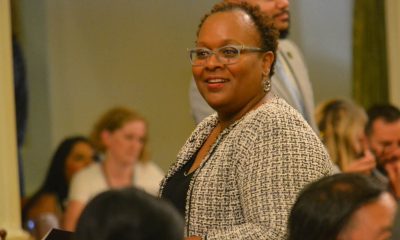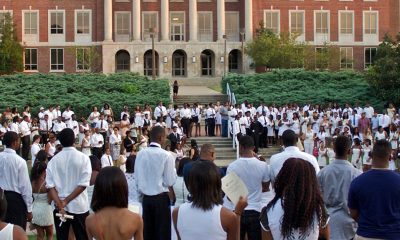Crime
DOJ Holds Local Hate Crime Forum
THE TENNESSEE TRIBUNE — It’s been six months since the racially-motivated desecration of Walnut Grove Missionary Baptist Church, another incident in a growing trend of such crimes over the past few years.
By Ashley Benkarski
MURFREESBORO, TN — It’s been six months since the racially-motivated desecration of Walnut Grove Missionary Baptist Church, another incident in a growing trend of such crimes over the past few years.
This isn’t the first time a place of worship has been attacked here—the Islamic Center of Murfreesboro was the target of a hate crime in August 2010, an act that garnered national attention and was featured on Comedy Central’s “The Daily Show with Jon Stewart.” It was vandalized again in 2017.
To address the community’s concerns over safety in places of worship, the Community Action Committee of Rutherford County and the Department of Justice’s Community Relations Service hosted a forum Mar. 5 at Middle Tennessee State University’s Tucker Theater that featured attorneys, federal, state and local law enforcement officials and local religious organizations. Attendees were given the opportunity to ask questions between panels to encourage open dialogue between congregations and the law enforcement community.
“No threat should be taken lightly,” Frank Haera, ATF supervisor, said. He added that congregations should be made aware and plans put in place for safe and effective emergency management in the event of a violent act. Law enforcement speakers stressed the importance of cameras and good lighting as deterrents as well as helping identify perpetrators.
The forum is one part of the CRS initiative to protect places of worship through educating the community about hate crimes and providing guidance for safety in the event of violence, such as bomb threats, arson or an active shooter situation. CRS also “works with communities in conflict to help rebuild relationships, facilitate mutual understanding, and encourage the development of local solutions.” It was established by Title X of the Civil Rights Act of 1964 and its mandate expanded in 2009 via the Matthew Shepard and James Byrd, Jr. Hate Crimes Prevention Act.
A hate crime is defined by the FBI as “a criminal offense against a person or property motivated in whole in or in part by an offender’s bias against a race, religion, disability, sexual orientation, ethnicity, gender, or gender identity,” with statutes varying by state. In Tennessee, a crime has to satisfy one of two requirements before it can be classified as a hate crime: 1) the act violated the civil rights of another via intimidation or coercion and 2) the act was committed against a place of worship. Hate crimes statutes are applied as enhancements to other offenses, such as vandalism, if the crime was motivated by bias against the victim. Victims are allowed input on the offender’s sentence—houses of worship are known to ask for hate crime charges to be dropped in an act of forgiveness—but the decision is ultimately up to the judge.
The existence of such hatred is a sad reality. “We are living in a strange time,” said ICM spokesperson Dr. Saleh Sbenaty, adding that “the political climate is not helping to heal the wounds” of the divided nation. “We are all God’s children,” said Rev. Richard Sibert of Walnut Grove.
The TBI’s 2017 report on hate crimes notes that anti-black bias was the motivation for the majority of crimes against persons and property, with crimes against persons being the most reported bias-motivated offenses. Intimidation, simple assault and aggravated assault were the most reported incidents against persons, with aggravated assault incidents reported at 38 in 2017, up from 19 the previous year. Destruction/damage/vandalism have been the leading reported crimes against property for the last 3 years; however, the number of incidents under this category has decreased 13.2 percent from 2016-2017.
If you or your congregation receive a threat, report it immediately by calling 911. For more information on hate crime statistics across the state, visit https://crimeinsight.tbi.tn.gov.
This article originally appeared in The Tennessee Tribune.
Activism
Oakland Post: Week of July 24 – 30, 2024
The printed Weekly Edition of the Oakland Post: Week of July 24 – 30, 2024

To enlarge your view of this issue, use the slider, magnifying glass icon or full page icon in the lower right corner of the browser window. ![]()
Activism
Oakland Post: Week of July 17 -23, 2024
The printed Weekly Edition of the Oakland Post: Week of July 17 -23, 2024

To enlarge your view of this issue, use the slider, magnifying glass icon or full page icon in the lower right corner of the browser window. ![]()
Antonio Ray Harvey
Lawmakers Incensed by ‘Watering Down’ of Language in Child Sex Solicitation Bill
After an emotional hearing on July 2, the Assembly Public Safety Committee voted to advance Senate Bill (SB) 1414 with an 8-0 vote. The legislation is an anti-sex-trafficking measure designed to increase penalties for those who purchase sex from children, SB 1414, co- authored by Senators Shannon Grove (R-Bakersfield), Anna Caballero (D-Merced) and Senator Susan Rubio (D-Baldwin Park), will be reviewed by the Assembly Appropriations Committee after the Legislature break ends on Aug. 5.

By Antonio Ray Harvey
California Black Media
After an emotional hearing on July 2, the Assembly Public Safety Committee voted to advance Senate Bill (SB) 1414 with an 8-0 vote. The legislation is an anti-sex-trafficking measure designed to increase penalties for those who purchase sex from children,
SB 1414, co- authored by Senators Shannon Grove (R-Bakersfield), Anna Caballero (D-Merced) and Senator Susan Rubio (D-Baldwin Park), will be reviewed by the Assembly Appropriations Committee after the Legislature break ends on Aug. 5.
The legislation has received bipartisan support. However, “critical amendments” were removed, Grove said. She is not satisfied with the language currently in the bill and is pressing members of the Assembly Public Safety Committee to allow key provisions to be restored.
“I am disappointed that they didn’t accept the amendments for all minors to be protected under felony convictions,” Grove said after the committee’s vote.
“I am not going to give up fighting for those 16- and 17-year-olds – and all minors,” Grove stated. “Now, the district attorneys would have to prove two crimes: that they were bought and sold in order to go back to the perpetrator (trafficker) who initiated the whole process.”
SB 1414 made it off the Senate floor with a 36-0 bipartisan vote on May 23. Before the floor vote in the Senate, the Senate Public Safety Committee amended SB 1414, weakening protections for children ages 16 and 17, Grove said.
The committee’s amendments included charging violators who purchase children 15 and under for sex as ‘wobblers’ (crimes that can be punished as a felony or misdemeanor). According to the current language of the bill, solicitation of a 16- and 17-year-old child is only punishable as a misdemeanor. The second amendment to the bill calls for the felony charge to only carry possible jail time — not time in prison.
Grove and her supporters’ other concern is that a third amendment to SB 1414 states that only perpetrators with a previous conviction of buying sex from a child 15 or under, on the second offense and with over a 10-year age gap of the victim, must register as a Tier 1 sex offender.
Dr. Stephany Powell, a retired Los Angeles Police Department sergeant who has over 30 years of sexual exploitation and trafficking experience gained through law enforcement, testified in front of the Assembly Public Safety Committee.
“First of all, there’s no way in the world that (these amendments) are protecting a 16- or 17-year-old,” said Powell, who now assists victims of human trafficking. “Just by the age alone, they are considered to be a victim of human trafficking. That’s your proof right there.”
Assemblymember Kevin McCarty (D-Sacramento), chair of the Public Safety Committee and a member of the California Legislative Black Caucus (CLBC), told Grove that he supports SB 1414 and commended her efforts to bring “more accountability to the sex trade.”
McCarty said he is willing to make SB 1414 “stronger,” but he is not willing to allow Grove to buck the rules of the Legislature to push her amendments through.
“That’s not on the table. As the rules, you know, we can’t go change that,” McCarty said of Grove’s amendments request.
On June 2, Anne Irwin, the founder and director of Smart Justice California, emailed California Black Media (CBM) a statement responding to SB 1414. Smart Justice sides with the amendments made by the Democrats in the Senate and the Assembly.
“With the recently adopted amendments, SB 1414 now represents a smart policy solution that prioritizes the safety and well-being of all minors,” Irwin stated. “By allowing felony prosecutions for solicitation of 16- and 17-year-olds when there is evidence of human trafficking, lawmakers have further improved the bill – which was originally overly broad and would have had harmful unintended consequences.”
-

 Arts and Culture3 weeks ago
Arts and Culture3 weeks agoRooted in Tradition: The Intricate History of Black Hair Braiding
-

 Bay Area4 weeks ago
Bay Area4 weeks ago“I Will Not Be Bullied,” Says Oakland Mayor Sheng Thao
-

 Bay Area2 weeks ago
Bay Area2 weeks agoPG&E Increases Rates While Bay Area Households Are Struggling to Stay Afloat
-

 Business3 weeks ago
Business3 weeks agoGov Newsom: Raising Fast Food Minimum Wage to $20 Pays Off as Jobs Multiply in Industry
-

 Activism4 weeks ago
Activism4 weeks agoOpponents of Mayor Sheng Thao Are Calling on Her to Resign Following FBI Raid
-

 Community1 week ago
Community1 week agoHundreds Come to Jehovah’s Witnesses’ Assembly Hall for Three-Day Program of ‘Good News’ in Fremont
-

 Bay Area2 weeks ago
Bay Area2 weeks agoJuneteenth Mass Shooting Suspect Charge with Multiple Counts of Felony Assault by Alameda County DA Pamela Price
-

 Activism4 weeks ago
Activism4 weeks agoOakland Coliseum Sale to AASEG: A Model for Community Development and Inclusion
























































